Google finally says it will kill censored Chinese search engine Project Dragonfly
The technology giant also rejected allegations that it has been infiltrated by Chinese intelligence agents

Google has finally said its controversial project to build a censored search engine for China has been "terminated".
Speaking at a Senate Judiciary Committee hearing on Tuesday, Google's vice president of public policy Karan Bhatia said Project Dragonfly had been abandoned.
The tech executive appeared at the hearing in Washington, DC, to face questions about Google's content policies,
His appearance came hours after US President Donald Trump said he will "take a look" at investigating Google for treason after Peter Thiel accused the technology giant of being infiltrated by Chinese agents.
Mr Bhatia told Republican Senator Josh Hawley at the hearing that Google has seen no evidence that it has been infiltrated by Chinese intelligence agents and that it did little business in China.
"Fundamentally in China we actually do very little today, certainly compared to any other major technology company," he said.
But under questioning from senators, Mr Bhatia declined to commit to not censoring content in China or to undergoing a third-party audit of its content moderation policies.
The lack of commitment drew sharp criticism from Mr Hawley.
"Clearly our trust and patience in your company and the behaviour of your monopoly has run out," he said. "It's time for some accountability."
Mr Thiel has financially backed several Republican politicians at the state and federal level, including Trump and Hawley, who have expressed concern about the influence of Google's search and advertising businesses.
The tech billionaire invested in Facebook soon after its founding and is a director at the social media company, which is Google's top rival for online ad spending.
He is also a director at data analytics software firm Palantir Technologies, which, like Google, competes to secure government technology contracts.
Additional reporting by agencies
Join our commenting forum
Join thought-provoking conversations, follow other Independent readers and see their replies
Comments
Bookmark popover
Removed from bookmarks